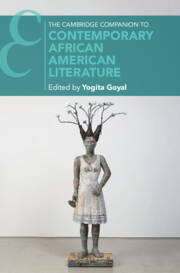Book contents
- The Cambridge Companion to Contemporary African American Literature
- The Cambridge Companion to Contemporary African American Literature
- Copyright page
- Contents
- Contributors
- Acknowledgments
- Chronology
- Introduction
- Part I Histories of the Present
- 1 African American Citizenship in the Post–Civil Rights Era
- 2 The Politics of Class
- 3 Rethinking Post-Racialism
- Part II African American Genres
- Part III Mapping New Identities and Geographies
- Part IV Critical Approaches
- Further Reading
- Index
- Cambridge Companions To …
1 - African American Citizenship in the Post–Civil Rights Era
from Part I - Histories of the Present
Published online by Cambridge University Press: 14 December 2023
- The Cambridge Companion to Contemporary African American Literature
- The Cambridge Companion to Contemporary African American Literature
- Copyright page
- Contents
- Contributors
- Acknowledgments
- Chronology
- Introduction
- Part I Histories of the Present
- 1 African American Citizenship in the Post–Civil Rights Era
- 2 The Politics of Class
- 3 Rethinking Post-Racialism
- Part II African American Genres
- Part III Mapping New Identities and Geographies
- Part IV Critical Approaches
- Further Reading
- Index
- Cambridge Companions To …
Summary
Through a focus on Claudia Rankine’s Citizen, Elizabeth Alexander’s inaugural poem “Praise Song for the Day,” and Amiri Baraka’s 9/11 poem “Somebody Blew Up America,” this chapter analyzes the twenty-first-century African American literary mood of melancholic hope (an inseparable fusion of melancholy and hope). When Citizen, “Praise Song for the Day,” and “Somebody Blew Up America” are read alongside each other, a profound tension emerges between the stasis of the afterlife of slavery and the movement of Black life that is not overdetermined by the afterlife of slavery. New ways of thinking about African American citizenship are one of the central focal points in the first decades of twenty-first-century African American literature. The simultaneity of the era of the first Black president (and the larger symbolism of a loosening of institutionalized antiblack racism) and the era of the Black Lives Matter movement continues to lead writers, working in the traditions of African American literature, to depictions of melancholic hope. This chapter ends with a focus on how the melancholic hope of twenty-first-century African American citizenship can produce a feeling of black transnational citizenship (the feeling of black collective unbelonging and a refusal of the imagined communities created by national borders).
Keywords
- Type
- Chapter
- Information
- Publisher: Cambridge University PressPrint publication year: 2023



